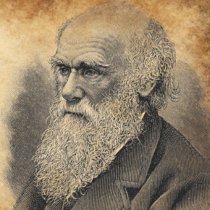 Charles Darwin on the Expression of Human Emotions
Charles Darwin on the Expression of Human Emotions
Helpful Hints for Alzheimer’s Disease Caregivers
As Alzheimer’s disease progresses into its middle stage and later, word-finding skills diminish and meaningful verbal communication becomes increasingly impaired or even nonexistent. The thoughts, desires and emotions of a person with AD still remain, but how can a caregiver discern what they might be?
The answer may, in part, be located in the research and writings of Charles Darwin; specifically, in his book The Expression of the Emotions in Man and Animals, first published in 1872, and long regarded as a seminal work in psychology. Here, Darwin makes the case for the instinctual or inherited nature of the facial expressions and body language that accompany our simple or primary emotions—anger and fear, surprise and disgust, joy and sadness, and other more complex emotions, too. Darwin terms these facial expressions and body language “the language of the emotions, ” and deems them a product of natural selection, a process of evolution.
For the most part, the simple emotions are generally easily detectable to an alert observer, but complex emotions—for instance, grief, indignation, helplessness, cheerfulness and perplexity—are more subtle, less well known.
The facial expressions and body language that accompany the simple and also the most important of the complex emotions are instinctual or innate, but a few, such as weeping and laughter, require repetition by an individual to achieve their fullest expression. Others, like the act of devotion, are first adopted by imitating other family members and later become habitual with practice and the passage of time. A person in a devotional or prayerful state of mind often lifts his or her eyes upwards or skywards, and presses the palms of their hands together.
Stephen Nash holds an MD from SUNY Buffalo and a Masters of Public Health in epidemiology from Emory University. He is the co-author of “Putting Evidence into Practice: Palliative Care, ” a British Medical Journal report, and “Reclassification of Simvastatin to Over-the-Counter Status in the United Kingdom, ” published in the American Journal of Cardiology.
Video how do you do tricks with fidget spinners? sissy advice on how to cum from anal onlyy Guy who does magic tricks on vine? how to improve a duck pond in offseason what is preenrollment for electronic remittane advice how to improve my coding skills If you dream about someone what does that mean? What is the meaning of spring season? how to impro e your political skills at work Which context clue provides the best hint for the meaning of the underlined idiom in this excerpt? How to make deep fried oreos? what information do i put in personal skills on a resume what is the definition of forsaken How to set up reported tips in quickbooks? What are the potential hazards relating to materials handling injuries? duellinks how long to farm skills what advice does aunt lupe give esperanza What does appeasement mean? what is the definition of reality what is the definition of mean absolute deviation what are the skills to be a nurse career advice from pension fund to what? What is dysuria? how to find the origin helper folder youtube What does 2 months pregnant look like? What does intermittent fasting do? what are the health benefits for turmeric What is the meaning of eunuchs in the bible? how to improve english speaking What is the meaning of perpetrators? what are the tax benefits of a 529 plan how to improve work from home productivity advice on how to make it through finals how to apply snap benefits south carolina how do spur skills work fire emblem what is the wheeled pipette helper called? What does instigating mean? What does clean title mean? what are medicare benefits part a & part b where are helper t cells found What does it mean to be wet? what are the benefits of eleuthero what is the difference between a pistol and a handgun




